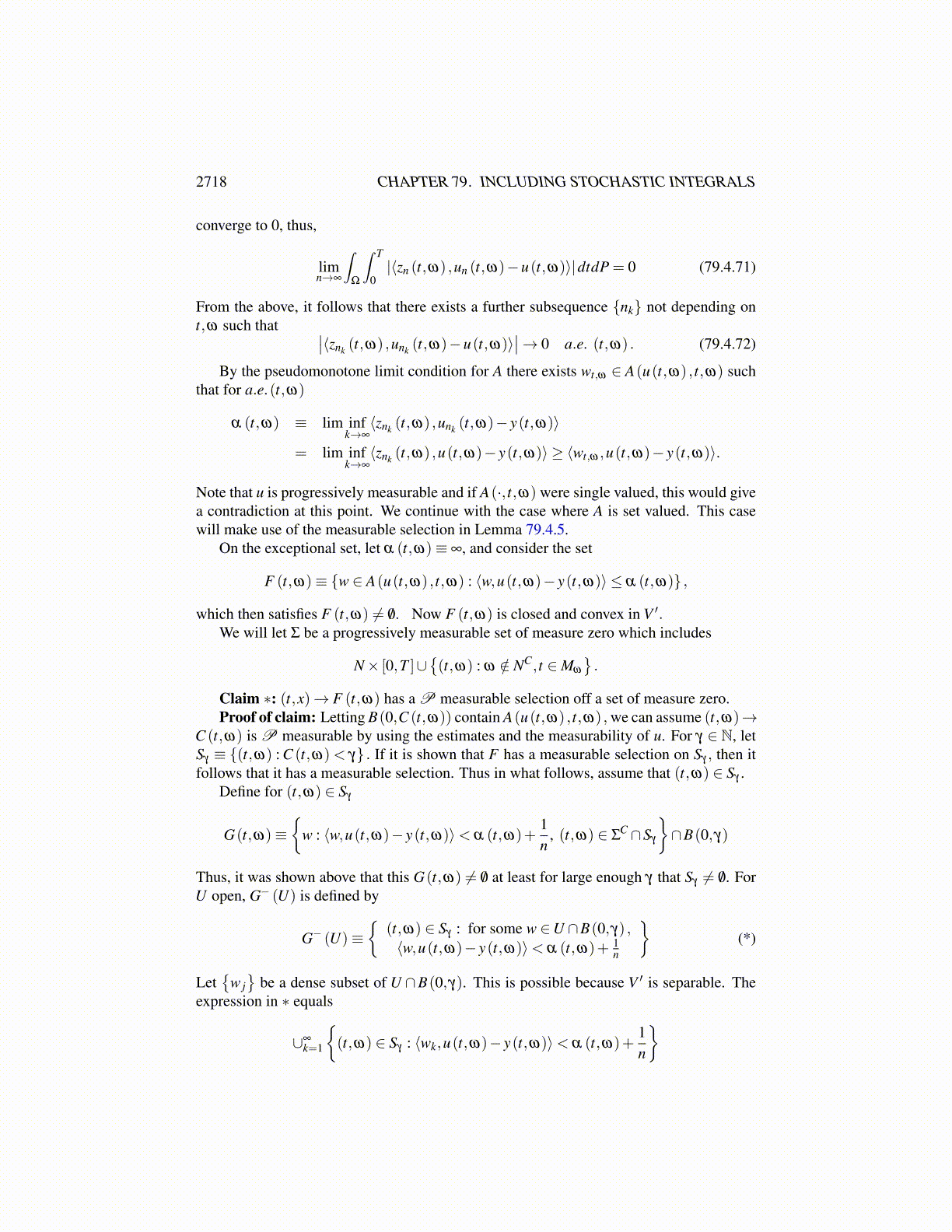
2718 CHAPTER 79. INCLUDING STOCHASTIC INTEGRALS
Now, the coercivity condition 3 shows that if y ∈ V , then
⟨zn (t,ω) ,un (t,ω)− y(t,ω)⟩ ≥ b3 ||un (t,ω)||pV −b4 (t,ω)−λ |un (t,ω)|2H−(
b1 ||un (t,ω)||p−1 +b2 (t,ω))||y(t,ω)||V .
Using p−1 = pp′ , where 1
p +1p′ = 1, the right-hand side of this inequality equals
b3 ||un (t,ω)||pV −b4 (t,ω)−b1 ||un (t,ω)||p/p′ ||y(t,ω)||V−b2 (t,ω) ||y(t,ω)||V −λ |un (t,ω)|2H ,
the last term being bounded by a function in L1 ([0,T ]×Ω) by assumption. Thus thereexists cy (·, ·) ∈ L1 ([0,T ]×Ω) and a positive constant C such that
⟨zn (t,ω) ,un (t,ω)− y(t,ω)⟩ ≥ −cy (t,ω)−C ||y(t,ω)||pV . (79.4.66)
Letting y = u, we use Fatou’s lemma to write
lim infn→∞
∫Ω
∫ T
0
(⟨zn (t,ω) ,un (t,ω)−u(t,ω)⟩+ cu (t,ω)+C ||u(t,ω)||pV
)dtdP≥
∫Ω
∫ T
0lim inf
n→∞⟨zn (t,ω) ,un (t,ω)−u(t,ω)⟩+
(cu (t,ω)+C ||u(t,ω)||pV
)dtdP
≥∫
Ω
∫ T
0
(cu (t,ω)+C ||u(t,ω)||pV
)dtdP.
Here, we added the term cu (t,ω) +C ||u(t,ω)||pV to make the integrand nonnegative inorder to apply Fatou’s lemma. Thus,
lim infn→∞
∫Ω
∫ T
0⟨zn (t,ω) ,un (t,ω)−u(t,ω)⟩dtdP≥ 0.
Consequently, using the claim in the last inequality,
0 ≥ lim supn→∞
⟨zn,un−u⟩V ′,V
≥ lim infn→∞
∫Ω
∫ T
0⟨zn (t,ω) ,un (t,ω)−u(t,ω)⟩dtdP
≥∫
Ω
∫ T
0lim inf
n→∞⟨zn (t,ω) ,un (t,ω)−u(t,ω)⟩dtdP≥ 0
hence, we find thatlimn→∞⟨zn,un−u⟩V ′,V = 0. (79.4.67)
We need to show that if y is given in V then
lim infn→∞⟨zn,un− y⟩V ′,V ≥ ⟨z(y) ,u− y⟩ V ′,V , z(y) ∈ Âu